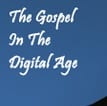 Cathy Lynn Grossman, in a USA TODAY article about the use of technology by churches writes, “Find the church by going online — the 21st-century version of sighting a steeple on the horizon. Beyond their website, Christ Fellowship has a Facebook page to give it a friendly presence in social media.
Cathy Lynn Grossman, in a USA TODAY article about the use of technology by churches writes, “Find the church by going online — the 21st-century version of sighting a steeple on the horizon. Beyond their website, Christ Fellowship has a Facebook page to give it a friendly presence in social media.
“You can download the worship program by scanning their customized-with-a-cross QR code. The worship services are streamed online from their Internet campus — with live chat running so you can share spiritual insights in real time.
“Afterward, says senior Pastor Bruce Miller, “someone will ask you, ‘How did it go? Did God help you, today? How can we help you?’ Just like we do when people come to our building in McKinney. We are here to help people find and follow Christ, wherever they are starting out from.”
“And wherever they are in the digital world.
“Christ Fellowship exemplifies most of the latest ways churches dramatically extend their reach of church beyond any one time or local address. Such congregations signal “a willingness to meet new challenges,” says Scott Thumma, of the Hartford Institute for Religion Research. He’s the author of a study by Faith Communities Today (FACT) of how churches, synagogues and mosques use the Internet and other technology.
“FACT’s national survey of 11,077 of the nation’s 335,000 congregations, released in March, found seven in 10 U.S. congregations had websites, and four in 10 had Facebook pages by 2010, Thumma says.
… “No matter the technology, the overall focus remains the same, Reynolds says.
“How can the Christian Church utilize the tools media has given us without being subsumed by them? You don’t want delivery to become everything,” he says.
Technology should ultimately be an enhancement, not a replacement, for gathering in person for worship, discussion, debate and service to others, Drew Goodmanson says.
In a similar fashion Albert Mohler writes of The Deep Limitations of Digital Church
http://www.albertmohler.com/2012/04/20/the-deep-limitations-of-digital-church/
“We can be enriched by means of listening to sermons online and by delving deeply into the ocean of knowledge found within Christian websites, but these cannot replace the authenticity that comes only by means of the local church and its ministry.
“Believers need the accountability found only within the local church. We need to hear sermons preached by flesh-and-blood preachers in the real-time experience of Christian worship. We need to confess the faith together through the ordinances of baptism and the Lord’s Supper. We need to confess our sins and declare forgiveness by the blood of Christ together. We need to be deployed for service in Christ’s name together.
“Without apology, we can learn much from preaching heard or seen over the Internet. Churches should engage digital technologies with the same eagerness that we use jet aircraft, copy machines, the printing press, and the telephone. At the same time, none of these can replace the fellowship of the saints and the centrality of the local church.
“A digital preacher will not preach your funeral. The deep limitations of digital technologies become evident where the church is most needed. Don’t allow the Internet to become your congregation. YouTube is a horrible place to go to church.
“It may be true that most people in this culture are, as Cathy Lynn Grossman observes, “in the digital world.” Just don’t forget that we are all in the real flesh-and-blood world, too — and that is where we go to church.
Tags: Church, Critique, Digital, technology
